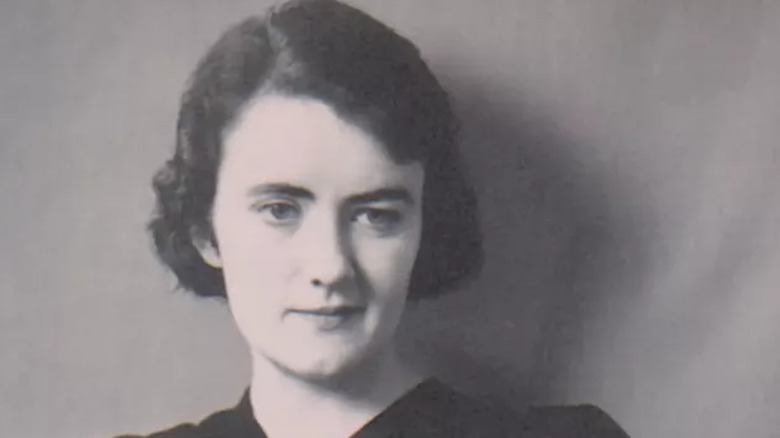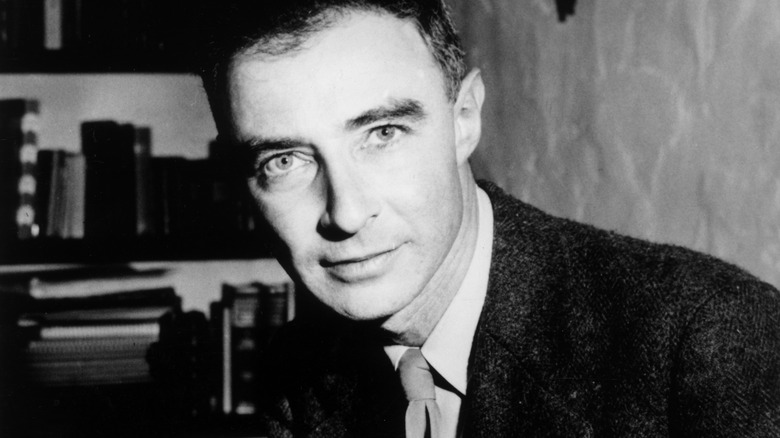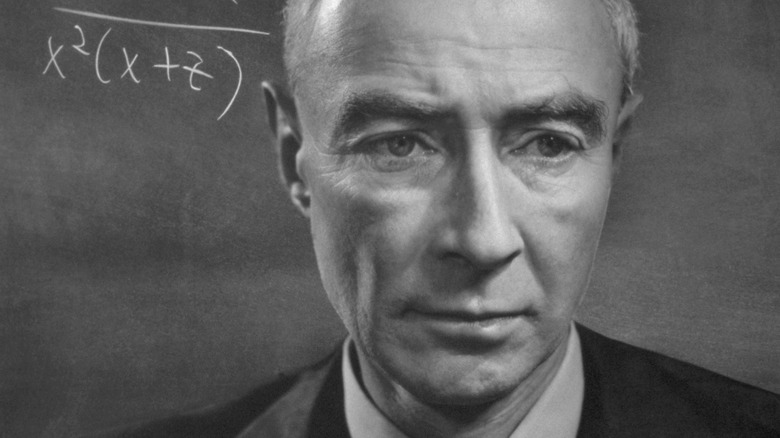Inside J. Robert Oppenheimer's Romance With Jean Tatlock
The father of the atomic bomb, J. Robert Oppenheimer was married and had two children with his wife, Katherine "Kitty" Oppenheimer. Before Oppenheimer and Kitty married, though, the physicist met and fell in love with Jean Tatlock, an ambitious medical student at Stanford Medical School, studying to be a psychiatrist. At that time, Oppenheimer — 10 years older than Tatlock — was a physics professor at the University of California, Berkeley, and acquainted with Tatlock's father. Oppenheimer met Tatlock when she was 22 years old, and a passionate, though ill-fated love affair blossomed between the two. Tatlock is now widely considered the love of Oppenheimer's life — while together, Oppenheimer proposed to Tatlock at least twice, but it wasn't meant to be (more on that below).
It was also during this period that Tatlock, a member of the Communist Party at that time, may have introduced Oppenheimer to radical politics. By 1939, they split up, but Oppenheimer's association with Tatlock resurfaced at his security hearings in 1954 over his own alleged communist sympathies, per the Atomic Heritage Foundation (AHF).
When their relationship ended, Oppenheimer and Tatlock stayed in touch, even after he married, and Oppenheimer visited Tatlock as late as 1943, the AHF elsewhere writes. About one year later, while Oppenheimer was at Los Alamos, New Mexico in 1944, leading the Manhattan Project and charged with the development of an atomic bomb, he learned Tatlock tragically died by suicide. She was 29.
She introduced Oppenheimer to the works of John Donne
Early in the their relationship, Jean Tatlock and J. Robert Oppenheimer bonded over a shared interest in English literature, and Tatlock introduced Oppenheimer to the works of English poet John Donne. It's thought the codename "Trinity", which is what Oppenheimer called the first test of an atomic weapon, was inspired by Tatlock via Donne's poetry. According to the Los Alamos National Laboratory, Oppenheimer was asked why he gave those early bomb tests that name. "Why I chose the name is not clear, but I know what thoughts were in my mind. There is a poem of John Donne, written just before his death, which I know and love," he responded. In the minds of many, this underscores Tatlock's profound influence on his life.
In their time together, SFGATE says Tatlock was conflicted about her own sexuality and whether or not she might be attracted to women, something she never seemed at peace with, which some theorize may have been behind the ends of their multiple engagements. She also had periods of deep, clinical depression that drove a wedge in their relationship — and Oppenheimer's issues with her also affected his mental health. Though he met and married Kitty Oppenheimer roughly a year after Tatlock ended things, Kai Bird and Martin Sherwin's "American Prometheus: The Triumph and Tragedy of J. Robert Oppenheimer" says the two were rumored to be lovers, at least on occasion.
The last time Oppenheimer is known to have seen Tatlock, in 1943, she was under observation for suspected ties to communism. While in San Francisco, an FBI agent reportedly saw Oppenheimer and Tatlock kiss, and watched while Oppenheimer seemed to spend the night at Tatlock's home.
Tatlock's father found her dead
When they last met in 1943, J. Robert Oppenheimer was already head of the Manhattan Project at Los Alamos, and for this reason, as well as her alleged communist politics, Jean Tatlock was under surveillance by federal agents, and her phone was tapped. That's why, when her father found Tatlock dead in her home, some suspected she may have been murdered. She left a suicide note, which read (via Biography), "I am disgusted with everything. To those who loved me and helped me, all love and courage. I wanted to live and to give and I got paralyzed somehow. I tried like hell to understand and couldn't." Like Oppenheimer, Tatlock's true political affiliations are disputed.
Years later, at his own security hearings, Oppenheimer was asked why he visited Tatlock in 1943. He said, "Because she was still in love with me." Oppenheimer was informed of Tatlock's death at Los Alamos. According to Robert Serber — a physicist who knew both Oppenheimer and Tatlock, and who worked with Oppenheimer at the Manhattan Project — he was, "deeply grieved." Serber added: "Jean was Robert's truest love. He loved her the most. He was devoted to her."
In their 2005 Oppenheimer book "American Prometheus," Kai Bird and Martin Sherwin wrote (via RadioTimes.com), Oppenheimer was "a key member of Jean's psychological support structure — and then he had vanished, mysteriously," to Los Alamos and the Manhattan Project. According to Bird and Sherwin, "In Jean's eyes, it may have seemed as if ambition had trumped love."
If you or someone you know is struggling or in crisis, help is available. Call or text 988 or chat 988lifeline.org.
If you or someone you know needs help with mental health, please contact the Crisis Text Line by texting HOME to 741741, call the National Alliance on Mental Illness helpline at 1-800-950-NAMI (6264), or visit the National Institute of Mental Health website.


